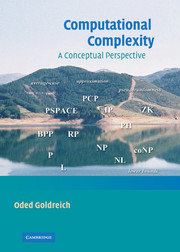Book contents
- Frontmatter
- Contents
- List of Figures
- Preface
- Organization and Chapter Summaries
- Acknowledgments
- 1 Introduction and Preliminaries
- 2 P, NP, and NP-Completeness
- 3 Variations on P and NP
- 4 More Resources, More Power?
- 5 Space Complexity
- 6 Randomness and Counting
- 7 The Bright Side of Hardness
- 8 Pseudorandom Generators
- 9 Probabilistic Proof Systems
- 10 Relaxing the Requirements
- Epilogue
- Appendix A Glossary of Complexity Classes
- Appendix B On the Quest for Lower Bounds
- Appendix C On the Foundations of Modern Cryptography
- Appendix D Probabilistic Preliminaries and Advanced Topics in Randomization
- Appendix E Explicit Constructions
- Appendix F Some Omitted Proofs
- Appendix G Some Computational Problems
- Bibliography
- Index
3 - Variations on P and NP
Published online by Cambridge University Press: 05 June 2012
- Frontmatter
- Contents
- List of Figures
- Preface
- Organization and Chapter Summaries
- Acknowledgments
- 1 Introduction and Preliminaries
- 2 P, NP, and NP-Completeness
- 3 Variations on P and NP
- 4 More Resources, More Power?
- 5 Space Complexity
- 6 Randomness and Counting
- 7 The Bright Side of Hardness
- 8 Pseudorandom Generators
- 9 Probabilistic Proof Systems
- 10 Relaxing the Requirements
- Epilogue
- Appendix A Glossary of Complexity Classes
- Appendix B On the Quest for Lower Bounds
- Appendix C On the Foundations of Modern Cryptography
- Appendix D Probabilistic Preliminaries and Advanced Topics in Randomization
- Appendix E Explicit Constructions
- Appendix F Some Omitted Proofs
- Appendix G Some Computational Problems
- Bibliography
- Index
Summary
Cast a cold eye On life, on death. Horseman, pass by!
W. B. Yeats, “Under Ben Bulben”In this chapter we consider variations on the complexity classes P and NP. We refer specifically to the non-uniform version of P, and to the Polynomial-time Hierarchy (which extends NP). These variations are motivated by relatively technical considerations; still, the resulting classes are referred to quite frequently in the literature.
Summary: Non-uniform polynomial-time (P/poly) captures efficient computations that are carried out by devices that can each handle only inputs of a specific length. The basic formalism ignores the complexity of constructing such devices (i.e., a uniformity condition). A finer formalism that allows for quantifying the amount of non-uniformity refers to so-called “machines that take advice.”
The Polynomial-time Hierarchy (PH) generalizes NP by considering statements expressed by quantified Boolean formulae with a fixed number of alternations of existential and universal quantifiers. It is widely believed that each quantifier alternation adds expressive power to the class of such formulae.
An interesting result that refers to both classes asserts that if NP is contained in P/poly then the Polynomial-time Hierarchy collapses to its second level. This result is commonly interpreted as supporting the common belief that non-uniformity is irrelevant to the P-vs-NP Question; that is, although P/poly extends beyond the class P, it is believed that P/poly does not contain NP.
Information
- Type
- Chapter
- Information
- Computational ComplexityA Conceptual Perspective, pp. 108 - 126Publisher: Cambridge University PressPrint publication year: 2008
